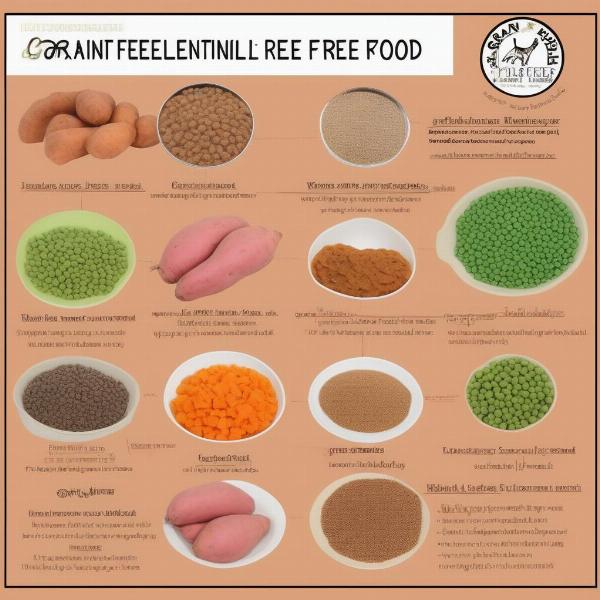Grain-free dog food has become increasingly popular in recent years, driven by marketing campaigns touting its potential health benefits. But is it truly the best choice for all dogs? This article delves into the world of grain-free diets, exploring the potential advantages and disadvantages, helping you make informed decisions about your canine companion’s nutrition. We’ll discuss who might benefit from a grain-free diet, who might not, and what to consider when making the switch.
Understanding Grain-Free Dog Food
What exactly does “grain-free” mean? Simply put, it signifies the absence of grains like wheat, corn, rice, barley, oats, and rye. These are often replaced with alternative carbohydrates like potatoes, sweet potatoes, peas, lentils, or tapioca. Many pet owners believe that grain-free diets are more natural, mimicking the diets of wild canids. However, domesticated dogs have evolved over millennia and are capable of digesting grains.
 Grain-Free Dog Food Ingredients
Grain-Free Dog Food Ingredients
Many pet owners choose grain-free dog food because their dog has a grain allergy or intolerance. While true grain allergies are relatively rare, some dogs may experience sensitivities to certain grains. In these cases, eliminating grains can lead to improved digestion and reduced skin issues.
Is Grain-Free Dog Food Right for Your Dog?
While grain-free diets can be beneficial for some dogs, they aren’t a universal solution. It’s crucial to consider your dog’s individual needs and health status. For example, some breeds are prone to taurine deficiency, an amino acid crucial for heart health. Grain-free diets have been linked to dilated cardiomyopathy (DCM) in some dogs, potentially due to ingredient formulations that impact taurine absorption.
“Choosing a grain-free diet should be a decision made in consultation with your veterinarian,” advises Dr. Emily Carter, a veterinary nutritionist at the Animal Wellness Center. “They can assess your dog’s individual needs and help you choose a diet that meets their specific requirements.”
Choosing the Right Grain-Free Dog Food
If you decide that a grain-free diet is appropriate for your dog, it’s essential to choose a high-quality product. Look for foods that list meat as the first ingredient and avoid those with excessive fillers or artificial additives. grain-free dog food discusses the nuances of choosing the right food for your furry friend.
Decoding Grain-Free Dog Food Labels
Reading dog food labels can be confusing. Look for the AAFCO (Association of American Feed Control Officials) statement, which indicates that the food meets minimum nutritional requirements. Also, pay attention to the guaranteed analysis, which lists the minimum percentages of crude protein, fat, fiber, and moisture. good grain free dog food offers more guidance on selecting high-quality grain-free options.
“Don’t be swayed by marketing hype,” cautions Dr. Sarah Miller, a veterinary dermatologist. “Focus on the ingredients and nutritional content to ensure your dog is receiving a balanced and complete diet.”
Transitioning to a Grain-Free Diet
If you’re switching your dog to a grain-free diet, do it gradually over several days to avoid digestive upset. Start by mixing a small amount of the new food with the old food and gradually increase the proportion of the new food over time. You may find salmon grain free dog food to be a palatable option for transitioning.
Conclusion
Grain-free dog food can be a suitable option for some dogs, particularly those with grain sensitivities or allergies. However, it’s crucial to make this decision in consultation with your veterinarian and to choose a high-quality product that meets your dog’s individual needs. Remember, a balanced and complete diet is essential for your dog’s overall health and well-being. grainfree dog food and butchers grain free dog food offer further reading on the topic.
FAQ
- Are all grain-free dog foods created equal? No, the quality of grain-free dog foods varies significantly. Choose a food with high-quality ingredients and a complete and balanced nutritional profile.
- Can puppies eat grain-free food? Yes, there are grain-free puppy foods available. However, consult your veterinarian before making any dietary changes for your puppy.
- Is grain-free dog food more expensive? Grain-free dog foods tend to be more expensive than traditional dog foods due to the use of alternative ingredients.
- Can grain-free dog food cause heart problems? While more research is needed, some studies have linked grain-free diets to dilated cardiomyopathy (DCM) in certain dogs.
- What are the signs of a grain allergy in dogs? Signs of a grain allergy can include itchy skin, digestive upset, and ear infections.
- Are there any alternatives to grain-free dog food? Yes, limited ingredient diets and hydrolyzed protein diets can be suitable alternatives for dogs with food sensitivities.
- How do I know if my dog needs a grain-free diet? Consult with your veterinarian to determine if a grain-free diet is the right choice for your dog.
ILM Dog is a leading international online resource dedicated to providing expert advice and information on all aspects of dog care and breeding. We cover a wide range of topics, from breed selection and health care to training, nutrition, grooming, and much more. Whether you’re a seasoned dog owner or just starting out, ILM Dog offers reliable and practical guidance to help you provide the best possible care for your furry friend. For expert advice and personalized guidance, contact us at [email protected] or call us at +44 20-3965-8624. Visit ILM Dog today!